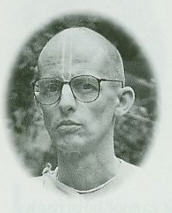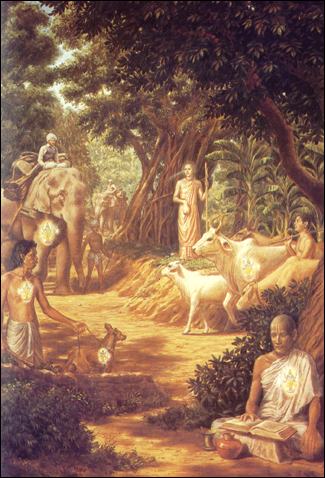
Satsvarupa Dasa Goswami
DEVOTEES KNOW that their bodies are temples of Visnu, or Krsna. Krsna, the Absolute Truth, appears in three features: as the impersonal Brahman, as the Supersoul, and as Bhagavan, the personal feature, the Supreme Personality of Godhead. As the Supersoul, the Lord resides in every body, in the heart, along with the individual soul. Therefore, devotees respect their own bodies by keeping them clean and following good practices for health. Devotees don't perform needless austerities, and they especially avoid austerities harmful to the body or not prescribed in the scriptures. Krsna tells us that such austerities are in the mode of ignorance. Similarly, devotees avoid ignorant foods such as meat, fish, and eggs. Devotees follow the injunction ofBhagavad-gita that one should not eat too much or too little, sleep too much or not sleep enough. They don't want to torture either the individual soul or the Supersoul residing in the body. A devotee recognizes that he does not own his body; the body is only rented from Krsna. Like any rental, it should be treated responsibly.
Devotees know that other people's bodies are temples of Visnu also. Srila Prabhupada writes in his purport to Bhagavad-gita 9.11, "A devotee should see that because Krsna is present in everyone's heart as Paramatma [the Supersoul], every body is the embodiment of the temple of the Supreme Lord; so as one offers respect to the temple of the Lord, he should similarly properly respect each and every body in which the Paramatma dwells. Everyone should therefore be given proper respect and should not be neglected." A devotee therefore extends respect not only to other human beings but to living beings in all species of life. When we recognize the Lord's presence in everyone's heart, we are more inclined to respect every living being. The Bhagavad-gita tells us that a learned person sees with equal vision a brahmana, an elephant, a dog, and a dog-eater (outcaste). One can see all living beings equally when one perceives the same Supersoul within the heart of all.
In the Srimad-Bhagavatam (4.3.22) Lord Siva explains this to his wife, Sati: "My dear young wife, certainly friends and relatives offer mutual greetings by standing up, welcoming one another, and offering obeisances. But those who are elevated to the transcendental platform, being intelligent, offer such respects to the Supersoul sitting within the body, not to the person who identifies with the body."
Lord Siva said this after he was insulted by Daksa, his father-in-law, early in the world's creation. Daksa was performing a great sacrifice, to which he had invited the demigods. He was a prajapati, one of the universal progenitors, and was therefore powerful. His body emanated a beautiful aura, and when people saw it they naturally offered him respect. When he entered the sacrificial arena, however, although all the others present stood up to receive him, Lord Siva was lost in meditation on Krsna and did not notice Daksa's arrival. Daksa was offended and in turn insulted Lord Siva.
Srila Prabhupada comments, "It may be argued that since Daksa was the father-in-law of Lord Siva, it was certainly the duty of Lord Siva to offer him respect. In answer to that argument, it is explained here that when a learned person stands up and offers obeisances in welcome, he offers respect to the Supersoul, who is seated in everyone's heart."

Lord Siva was not neglecting Daksa; since Lord Siva was already offering respects to the Supersoul of the universe, those respects naturally included respects to the Supersoul in Daksa's heart.
Still, devotees offer respects not only to the Supersoul but also to the individual soul. Therefore a devotee may offer obeisances differently according to the soul's development. Although there is no such thing as "better" souls or "lesser," different living entities have different degrees of advancement. One living entity may identify with his or her bodily existence whereas another may be liberated from bodily identification. If we were offering respects only to Lord Visnu, we would offer the same respect to every living entity, but because we respect the individuality of the soul, we offer respect according to the living entity's nature.
Those in the gross mode of ignorance cannot see the soul. Those in the mode of passion, preoccupied with bodily forms, cannot see the underlying equality and unity of all beings. But Krsna defines knowledge in the mode of goodness as follows: "That knowledge by which one undivided spiritual nature is seen in all living entities, though they are divided into innumerable forms, you should understand to be in the mode of goodness." Srila Prabhupada writes, "A person who sees one spirit soul in every living being, whether a demigod, human being, animal, bird, beast, aquatic, or plant, possesses knowledge in the mode of goodness. In all living entities, one spirit soul is there, although they have different bodies in terms of their previous work."
"Oneness" in this sense does not mean that there is one soul in myriad bodies, as the impersonalists teach, but that an individual soul of equal quality is present in the heart of each living being. A plant has a soul, and we offer the respects appropriate for a soul in a plant's body. For obvious reasons, although we respect the presence of the soul and Supersoul in the body of a tiger, we do so from a distance.
Of course, we show the most respect to other human beings, but a devotee does not base that respect on a person's material position. Devotees shouldn't look at other living entities as objects to gratify their senses. Therefore, men should respect women as mothers and no one should try to exploit other living beings for sense gratification. To exploit others is to exploit the resources of the Lord's temple and thus defile it.
A devotee offers the most respect to pure devotees. The Nectar of Instruction advises that one respect devotees in terms of their relationship with Krsna: "One should mentally honor the devotee who chants the holy name of Krsna, one should offer humble obeisances to the devotee who has undergone spiritual initiation and is engaged in worshiping the Deity, and one should associate with and faithfully serve that pure devotee who is advanced in undeviated devotional service and whose heart is completely devoid of the propensity to criticize others."
The highest repository of respect for a devotee is someone advanced in pure devotional service and free from envy. Freedom from envy means freedom from the bodily concept. The nonenvious devotee has the ability to see the "one" soul in all living beings. Such a humble devotee has nothing to gain from anyone but everything to give, because he possesses Krsna.
Satsvarupa Dasa Goswami travels extensively to speak and write about Krsna consciousness. He is the author of more than two dozen books, including a six-volume biography of Srila Prabhupada.
